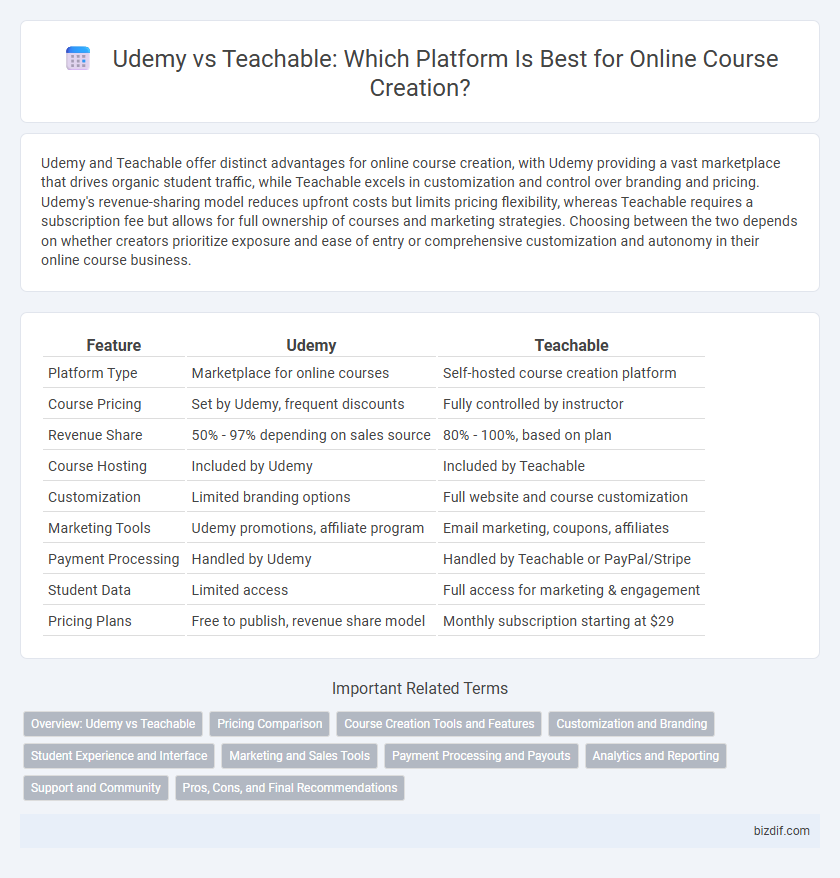Udemy and Teachable offer distinct advantages for online course creation, with Udemy providing a vast marketplace that drives organic student traffic, while Teachable excels in customization and control over branding and pricing. Udemy's revenue-sharing model reduces upfront costs but limits pricing flexibility, whereas Teachable requires a subscription fee but allows for full ownership of courses and marketing strategies. Choosing between the two depends on whether creators prioritize exposure and ease of entry or comprehensive customization and autonomy in their online course business.
Table of Comparison
| Feature | Udemy | Teachable |
|---|---|---|
| Platform Type | Marketplace for online courses | Self-hosted course creation platform |
| Course Pricing | Set by Udemy, frequent discounts | Fully controlled by instructor |
| Revenue Share | 50% - 97% depending on sales source | 80% - 100%, based on plan |
| Course Hosting | Included by Udemy | Included by Teachable |
| Customization | Limited branding options | Full website and course customization |
| Marketing Tools | Udemy promotions, affiliate program | Email marketing, coupons, affiliates |
| Payment Processing | Handled by Udemy | Handled by Teachable or PayPal/Stripe |
| Student Data | Limited access | Full access for marketing & engagement |
| Pricing Plans | Free to publish, revenue share model | Monthly subscription starting at $29 |
Overview: Udemy vs Teachable
Udemy offers a vast marketplace with millions of students, providing extensive reach and built-in marketing tools for course creators. Teachable allows more control over branding and pricing, enabling instructors to create fully customized online schools with integrated payment options. Both platforms support diverse course formats, but Udemy excels in audience size while Teachable prioritizes creator independence and scalability.
Pricing Comparison
Udemy charges a revenue split of 50% for organic sales and up to 97% to instructors when they bring their own students, while Teachable offers subscription plans ranging from $39 to $499 per month with transaction fees between 0% and 5%. Udemy's pricing model is beneficial for instructors who want to minimize upfront costs but share revenue, whereas Teachable provides more control and potentially higher earnings through monthly plans and lower fees. Comparing costs depends on the instructor's sales volume and preference for fixed versus variable fees, impacting overall profitability.
Course Creation Tools and Features
Udemy offers a streamlined course creation platform with built-in tools for video hosting, quizzes, and student engagement, ideal for instructors seeking ease of use and a ready marketplace. Teachable provides advanced customization options, including drip content, integrated payment gateways, and affiliate marketing support, catering to creators who want control over branding and sales. Both platforms support multimedia lessons and student analytics but differ in scalability and marketing capabilities tailored to diverse teaching needs.
Customization and Branding
Teachable offers extensive customization options, allowing course creators to fully brand their websites with custom domains, logos, and personalized landing pages, enhancing the professional appeal. Udemy limits branding opportunities, as courses are hosted on a shared platform with Udemy's branding and restricted control over course page design. For creators prioritizing strong customization and unique brand identity, Teachable provides more flexibility and control compared to Udemy's standardized format.
Student Experience and Interface
Udemy offers a user-friendly interface with a vast marketplace that enables students to access diverse courses easily and benefit from reviews and ratings, enhancing decision-making. Teachable provides a more personalized learning environment with customizable course pages and direct communication tools, fostering deeper instructor-student interaction. Both platforms optimize mobile usability, but Udemy's streamlined navigation supports casual learners, while Teachable suits those seeking a tailored educational experience.
Marketing and Sales Tools
Udemy offers extensive marketing reach with built-in audience access and promotional deals, providing course creators with automatic exposure to millions of learners. Teachable emphasizes customizable sales tools, including advanced pricing options, affiliate marketing features, and integrated email marketing to help instructors build and retain their own audience. Both platforms support coupon codes and sales tracking, but Teachable grants more control over branding and customer relationships essential for long-term sales growth.
Payment Processing and Payouts
Udemy handles payment processing for instructors, taking care of transactions, taxes, and international currency conversions, but offers less control over pricing and payout timing. Teachable provides creators with more flexibility, allowing them to use integrated gateways like Stripe and PayPal, set customized pricing, and receive payouts on a weekly or monthly basis. Understanding each platform's fee structures and payout schedules is critical for optimizing revenue in online course creation.
Analytics and Reporting
Udemy offers built-in analytics with detailed insights on student engagement, course performance, and revenue tracking, enabling educators to optimize content and marketing strategies effectively. Teachable provides robust reporting tools, including advanced sales tracking, affiliate reports, and student progress metrics, giving creators granular control over course data analysis. Both platforms support data-driven decision-making, but Teachable's customizable reports cater more to course creators seeking in-depth business intelligence.
Support and Community
Udemy offers extensive instructor support through its dedicated help center, detailed guides, and a large instructor community forum that facilitates peer collaboration and knowledge sharing. Teachable provides personalized customer support with direct email access, live chat, and an active Facebook community where creators discuss best practices and troubleshoot course building challenges. Both platforms emphasize robust community engagement, but Udemy's broader instructor base fosters diverse interactions while Teachable's support model prioritizes tailored assistance.
Pros, Cons, and Final Recommendations
Udemy offers a vast marketplace with high traffic, enabling course creators to reach millions of students quickly, but it charges significant revenue shares and limits pricing control. Teachable provides greater customization, branding options, and full pricing control, making it ideal for instructors seeking independence, though it requires more effort in marketing and driving traffic. For those prioritizing wide exposure with minimal marketing hassle, Udemy is recommended; for educators wanting full control and scalable business potential, Teachable is the better choice.
Udemy vs Teachable Infographic

 bizdif.com
bizdif.com